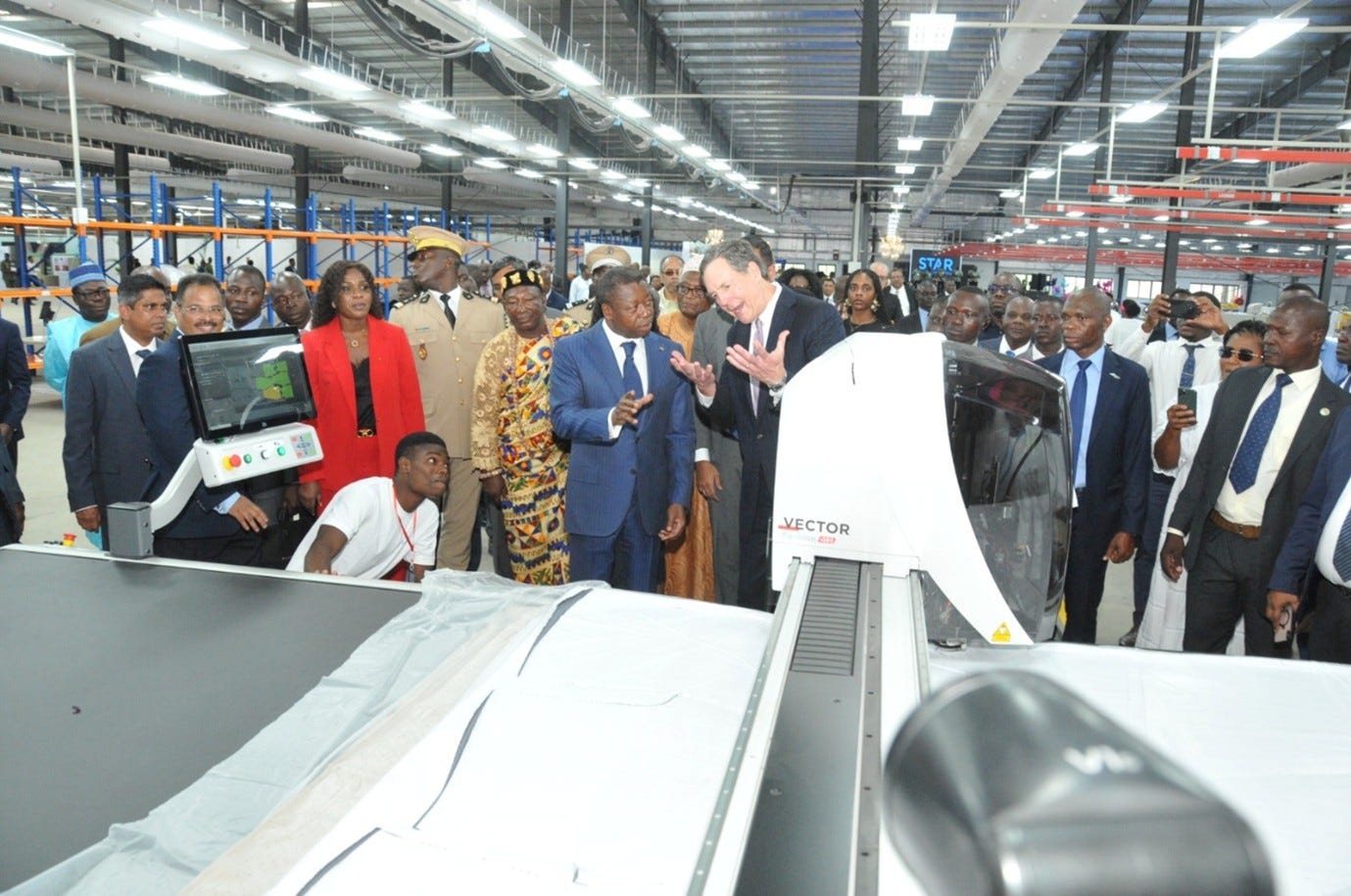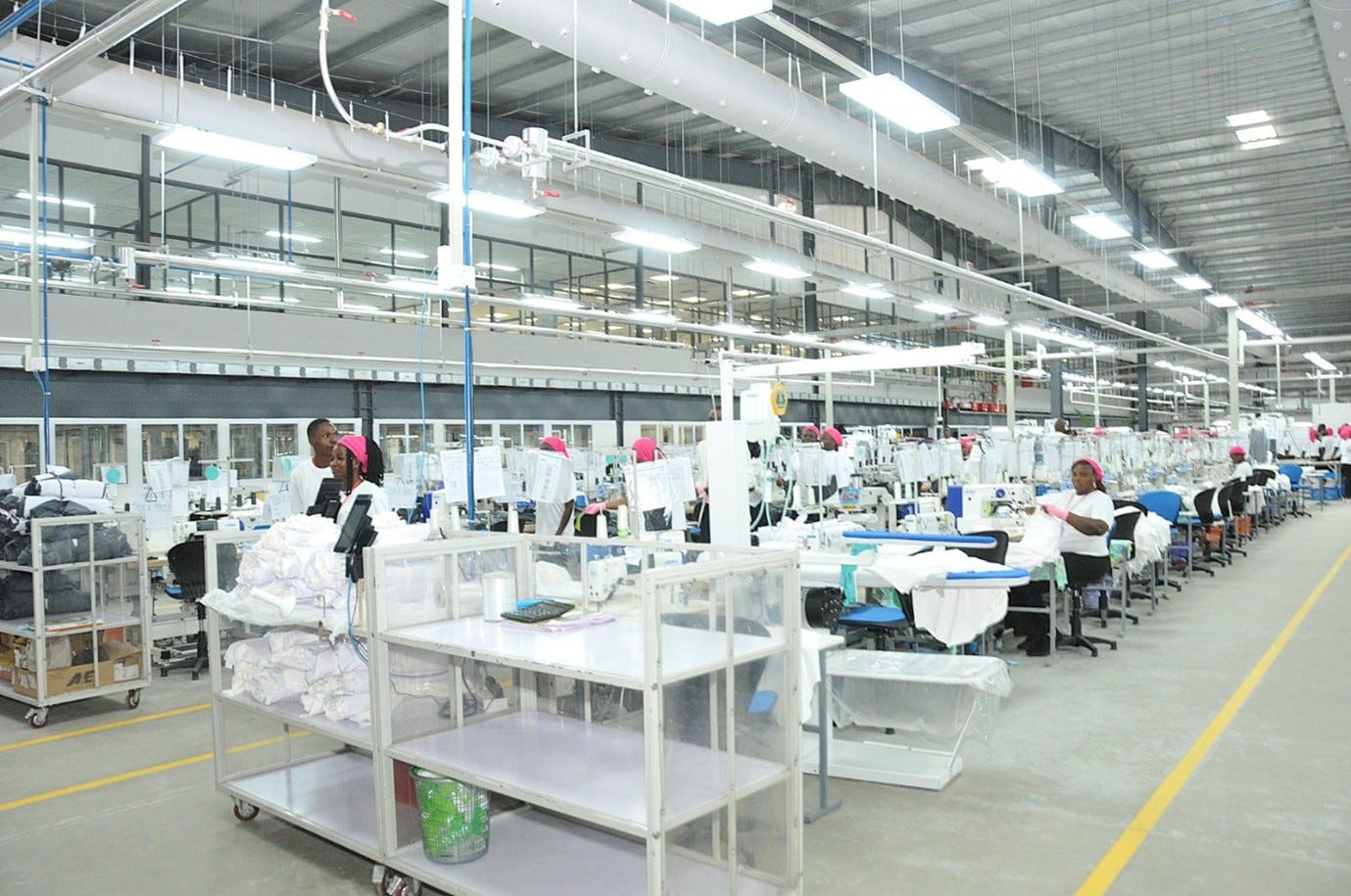Pulse54: Togo’s new economic chapter
The launch of a new $25M garment factory signals efforts to revive a promising industrial sector, helped by reforms, infrastructure development, and fresh investments.
Hey there👋🏽
Welcome to the latest edition of Pulse54 by Daba, your twice-weekly signal on the future of Africa.
This week, we’re diving into Togo’s industrial renaissance and how this is attracting outsize interest from foreign investors.
👉 Subscribe to get fresh insights every week — straight to your inbox.
Before we dive into this week’s story, here’s a quick tip if you’re looking to invest in African stocks, bonds and more.
Get the Daba app now for:
✅ Multiple asset classes
✅ Multi-currency support
✅ Real-time market data
✅ Curated opportunities
✅ Expert-backed strategies
Visit daba.finance/app to get started today. Moving on…
On June 18, Togo marked a major milestone with the launch of the Star Garments factory at the Adétikopé Industrial Platform, just outside its capital, Lomé.
This $15M facility is backed by the IFC and Komar, a US-based global apparel leader.
It will create 4,500 jobs by 2030, with a strong focus on women’s employment and environmental sustainability.
For Togo, the factory isn’t just about jobs—it’s a powerful signal to global investors that the country is open for business.
This latest development is part of a larger vision.
Togo, one of the world’s biggest phosphate producers, is positioning itself as a manufacturing and logistics hub for West Africa.
Its deepwater port in Lomé is already one of the largest (4th) and most efficient on the continent, and the country’s new industrial platforms aim to capitalize on that by attracting companies that want smooth access to global trade routes.
The Plateforme Industrielle d’Adétikopé (PIA), where the Star Garments factory is located, is central to this strategy.
With high-quality infrastructure, easy customs procedures, and targeted tax incentives, it’s designed to foster high-value manufacturing in textiles, agri-processing, and beyond.
Togo’s broader macroeconomic picture has become increasingly attractive.
Its economy grew 5.3% in 2024, powered by strong commodity prices and reforms in tax mobilization.
This year, real GDP growth forecasts range from 5.3% to 5.8%, higher than regional and sub-Saharan Africa averages.
Inflation was brought down to 2.2% by April, one of the lowest rates in the region.
And the country’s fiscal deficit (when a government spends more money than it earns from taxes and other income) has steadily narrowed, expected to drop to 4% in 2025 and 3% by 2026.
The government has implemented 74% of its Extended Credit Facility (ECF) reform plan, earning recognition from the IMF for its commitment to stability and discipline.
This across-the-board progress is drawing investor interest from across the globe.
Singapore-based agro-giant Olam acquired a majority stake in Togo’s national cotton company, NSCT, while NutriSource launched a fertilizer plant to support agriculture in the north.
TotalEnergies leads the local energy sector, and Heidelberg Materials is introducing eco-friendly cement production techniques.
Despite lingering security issues in northern regions and political tension, investors continue to move in, betting on Togo’s reform-minded leadership and strong institutional partnerships.
Financial services have also become a key part of this emerging story.
Togo is home to Oragroup, the country’s only stock listed on the BRVM regional exchange.
Headquartered in Lomé, Oragroup operates in 12 countries and serves as a gateway to West and Central Africa’s banking sector.
After a challenging 2024, the bank staged a strong comeback in the first quarter of 2025, posting a net profit of 4.8B FCFA ($8.4M), up 259% from the previous year.
Even as revenue dipped slightly, pre-tax profits climbed to 5.8B FCFA, thanks to cost-cutting, better risk management, and a focus on digital transformation.
For investors seeking exposure to Togo’s growth, Oragroup—currently trading near historic lows—presents an interesting value play in a recovering financial sector.
The bank’s renewed profitability and strategic expansion suggest potential upside if current trends continue, and the stock is easily accessible to investors via the Daba app.
Togo’s reform efforts have not gone unnoticed by the international community.
A recent report by the OECD and UNCTAD highlights the country’s inclusive, collaborative approach to industrial strategy.
The creation of institutions like the Togo Investment Promotion Agency (API-ZF) and its success in deploying special economic zones demonstrate how public-private coordination is making the business environment more predictable and transparent.
This approach is boosting investor confidence and unlocking new flows of capital into sectors like agro-processing, logistics, and manufacturing.
With its improving fiscal metrics, low inflation, and investor-friendly reforms, Togo is carving out a unique place in West Africa’s economic landscape.
It’s a country small in size with just 9.5M people and $10B GDP, but increasingly large in ambition.
By investing in infrastructure, easing regulations, and encouraging value addition, it’s proving that even smaller economies can play a big role in Africa’s transformation.
And for investors ready to take a closer look at emerging markets in Africa, Togo offers a rare blend of macro stability, reform momentum, and real investment opportunity.
Get the Daba app today and be part of West Africa’s next big growth story.
That’s it for this week.
You can also download the Daba app to access vetted investment opportunities in African VC - from exciting early-stage startups to professionally managed venture funds.
Until next time!








